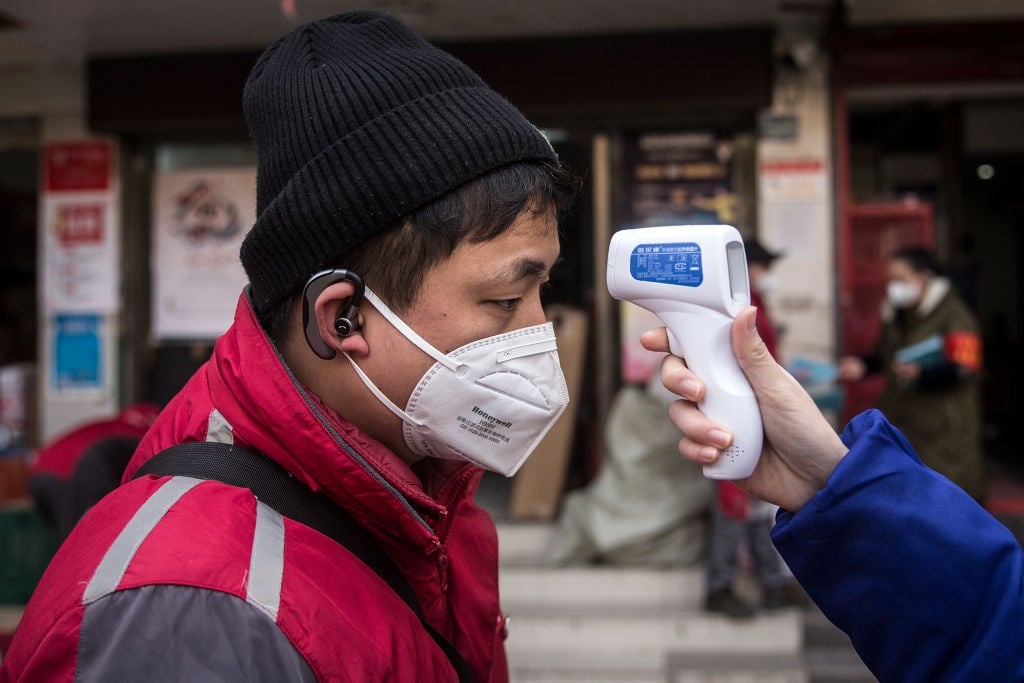
Governments have no excuse for not being ready, warns world health body, while economists revise growth forecasts downwards.
The World Health Organisation (WHO) on Friday raised its global health risk assessment of the new coronavirus to the highest level of alert – the virus has spread to at least 49 countries within a matter of weeks.
Dr Michael Ryan, executive director of the WHO’s health emergencies programme, on Friday said: “We are on the highest level of alert or highest level of risk assessment in terms of spread and in terms of impact.
“The organisation isn’t trying to alarm or scare people. This is a reality check for every government on the planet. Wake up, get ready. This virus may be on its way and you need to be ready.
“You have a duty to your citizens. You have a duty to the world to be ready.”
He said world leaders still had a chance to contain the virus within their national boundaries. “To wait, to be complacent, to be caught unawares at this point – it’s really not much of an excuse.”
In total 4 350 cases and 67 deaths have been confirmed in 48 countries outside of China, Dr Tedros Adhanom Ghebreyesus, director-general of the WHO, said.
In 24 countries, the spread has been isolated to a single case.
He said that, in most cases, the virus could still be traced back to known contacts or clusters of cases, and there wasn’t any evidence as yet that the virus was spreading freely in communities, which is why it had not been declared a global pandemic.
South Africa’s National Institute for Communicable Disease (NICD) said that the first case had also been reported south of the Sahara, in Nigeria.
According to the NICD, there had been no confirmed cases in South Africa by Friday night, while 133 people had been tested.
However, two South Africans on the passenger ship the Diamond Princess had contracted the disease.
Meanwhile, economists and businesses at home have begun to quantify the potential effects the virus could have on the beleaguered South African economy.
South Africans can expect a shortage of peanuts, blankets, heaters and electronic equipment over the coming weeks.
On top of that, the domestic crayfish, tourism and building industries say they have already taken a knock because of travel and other restrictions aimed at combating the spread of the virus.
Retail chain Woolworths this week warned that there could be a shortage of certain imported goods within two weeks because some Chinese factories have been closed. Supermarket chain Shoprite has also said it was struggling to import blankets and heaters, reports Business Insider SA.
Trade Map data shows that 53% of the electrical machinery, equipment and television sets that South Africa imports come from China, as well as more than 70% of knitted material.
Corné Louw, a senior economist at Grain SA, said a large percentage of South Africa’s agricultural inputs were imported, and suppliers have warned of increased delivery times of between 50 and 60 days for imports from China.
Almost 100% of the active ingredients required for agricultural chemicals are also imported, largely from China. Louw said the local industry should, however, be able to overcome the challenges through good planning to ensure that food security was not affected.
Natalie Reyneke, director at MDA Construction & Technology Attorneys, said that scores of construction projects had been delayed because materials and components from Asia were not being delivered.
Bloomberg reports that 23% fewer ships sailed out of Hong Kong in January when compared with the year before. This is much worse than the anticipated 3.7% decrease.
According to Reyneke, suppliers are unable to confirm when supplies will arrive in South Africa and some deliveries have been indefinitely postponed. At least one client fears that he will have to commence layoffs if parts that have been ordered do not arrive by the end of this month.
Lullu Krugel and Christie Viljoen, economists at PwC, said in a report released last week that cellphone operators, vehicle manufacturers, and the retail and hospitality industry in South African could take a hit because China is South Africa’s biggest trading partner.
China is South Africa’s largest supplier of imports and biggest buyer of exports.
Cellphones are South Africa’s biggest import category according to value. China supplies 85% of all South Africa’s cellphones.
In respect of exports, lower Chinese demand for South African minerals could have a serious impact on various mining companies, said PwC.
Iron ore, manganese and chrome make up two-thirds of South Africa’s total exports to China, according to value.
According to the International Monetary Fund, a decline of just one percentage point in Chinese economic growth could cost South Africa 0.2 percentage points in growth.
According to the worst-case scenario, in which the virus is not brought under control before the second half of the year, China’s economic growth could be just 5% instead of the estimated 5.9%.
 | ||||||||||||||||||||||||||
Get in touchCity Press | ||||||||||||||||||||||||||
| ||||||||||||||||||||||||||
| Rise above the clutter | Choose your news | City Press in your inbox | ||||||||||||||||||||||||||
| City Press is an agenda-setting South African news brand that publishes across platforms. Its flagship print edition is distributed on a Sunday. |




 Publications
Publications
 Partners
Partners








